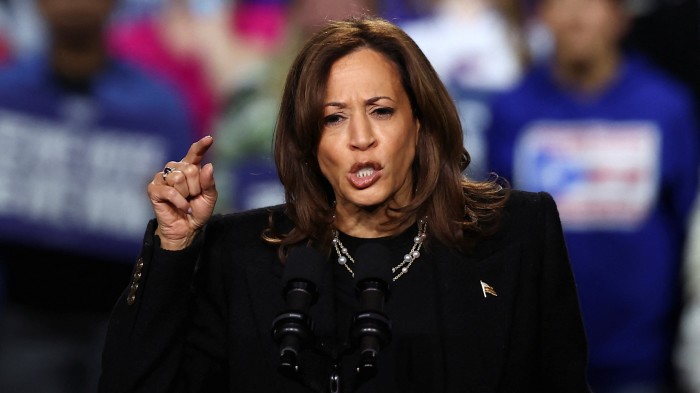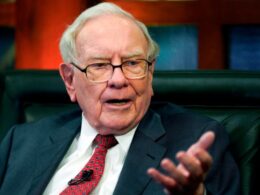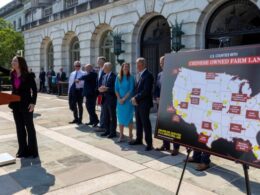Democrats have finally found a cause around which to unite: detestation of Kamala Harris’s memoir. The more Washingtonians condemn something, the more fulfilled they seem. Schadenfreude qualifies as a state of happiness inside the beltway.
I have no concerns about Harris’s book sales. Precisely because of its gossipy score-settling, 107 Days is probably on course to break even on her reported $20mn advance. I am less sanguine about her career prospects. Having forsworn a 2026 bid at the California governorship, Harris has left open the possibility of a second go at the White House in 2028. Her book seems to have torpedoed whatever chances she had. “If this was intended as a campaign launch, I don’t think it got off the pad,” David Axelrod, a former senior adviser to Barack Obama, told Politico. “If it was intended as a catharsis, only she can know if it was successful.”
I am neither in the camp of Harris detractors nor admirers. The former believe she is an overrated ladder climber who was Joe Biden’s diversity hire. They are right in the sense that Biden was Obama’s diversity hire and LBJ was John F Kennedy’s. Tickets, particularly Democratic ones, are obsessed with balance — the old white man needed a woman of colour, just as the young black man needed a white working-class running mate and the youthful Harvard Catholic required a Texan plain-talker. For some reason Republicans are less obsessed with balance. Other than their age difference and home state, Donald Trump and JD Vance are hardly complementary.
Which brings me to the value of Harris’s book. She unwittingly reveals the bankruptcy of the Democrats’ rule book. Harris should have selected Pennsylvania’s governor Josh Shapiro or Pete Buttigieg, the former 2020 candidate and Biden’s secretary of transportation. The first she deemed too ambitious, which should hardly be disqualifying for that job, as Harris herself can attest. What she does not mention were fears that Shapiro’s pro-Zionist statements might have triggered the left of the party. In fact, confronting the left might have done Harris some good. On Buttigieg, Harris states plainly that America could not have taken a gay man and a non-white woman on the same ticket. So instead she went for the hokey Tim Walz. He proved to be an OK campaigner but a terrible debater. Either way, Harris’s book has incited disputatious statements from Shapiro’s spokesperson and from Buttigieg directly. Since those around Biden spent years freezing Harris out (which shows that Biden selected her for one job only that ended the day night of his victory), their enmity is not new. But Harris has now defined herself as a whiner who turned on her former boss.
What did for Harris, however, was not her demography, nor her 15-week window — the brevity of which might even have been helpful — but her lack of ideas.
I covered the race yet even I can’t remember the content of her economic message. There was something about price gouging and cheaper mortgages and some vaguely progressive fiscal policies but nothing to hold it together. Her pudding had no theme. Those asking “where’s the beef?” were served with blancmange. On the subject of identity politics, Harris concedes she was cornered by Trump’s famous pronoun ad, “Kamala is for they/them, I am for you”. Her response, she says, should have been that Harris is for “we” and Trump is for himself. The latter is certainly true. And the former would have been a good riposte. But how would she have fleshed out the “we”? Most people see Democrats as an amalgamation of interest groups plus the educated elites. They have lost the ability to appeal to the multiracial middle. Harris’s campaign was emblematic of that affliction.
Democrats can dole out all the disapproval they think Harris deserves. But they are targeting the wrong problem. Her deficiencies are theirs and they need to fix them. I’m turning this week to our great DC bureau chief, James Politi. James, we were together at Harris’s Chicago convention in August 2024, which seemed at the time like a success but was in retrospect a collective sigh of relief that Biden had dropped out. Where do you think Harris went wrong, and what lessons have Democrats learned?
Recommended reading
-
My column this week, America’s accelerating exit from itself, looks at how Trump and the right is leveraging Charlie Kirk’s death to assault time-honoured American freedoms. “A few months before the 250th anniversary of the declaration of independence, Trump is pulverising the country’s founding principles with remarkable ease,” I write.
-
On the same subject but in his own inimitable style, George Packer’s Atlantic essay on “America’s Zombie Democracy” is a bracing read. I was particularly struck towards the end by Packer’s treatment of AI’s threats to political liberty and a gobsmacking quote from Sam Altman.
-
I shouldn’t always recommend Gideon Rachman’s columns (or perhaps I should?) but his latest on Putin’s dangerous game with Nato is essential reading. Though it would be reckless for Putin to test Nato’s will, we have seen that the Russian autocrat is more than capable of reckless gambles, Gideon argues.
-
Those interested in why Trump is targeting India might find value from this 35-minute conversation I had with The Wire’s Karan Thapar.
James Politi replies
Thanks Ed. Given all we have learned about the completely dysfunctional relationship between Harris and Biden over the past few weeks, it is surprising the election was even as close as it was, with Trump winning the national popular vote by 1.5 percentage points.
The Chicago convention was probably the high point of the campaign for Harris, along with the debate in Philadelphia in September. But her momentum faded after that, and she was unable to capitalise on Trump’s very dark, dystopian closing message to voters in late October and early November.
It is clear from her memoir that she made a mistake in not distancing herself sufficiently from Biden. I was struck by the passage in her book in which she describes the phone call she received right before the debate from Biden warning her that the city’s power brokers were threatening not to support her. He did not seem to be fully on the same team.
It is also evident now — and probably a lesson for all future nominees — that she should have gone for her first choice as VP, Pete Buttigieg, rather than making a calculated choice that pleased all sides of the party in Tim Walz.
On policy, I would argue she should have stuck to a consistently populist economic message throughout. Instead, she veered back and forth, and settled on a more business-friendly stance than won her no favours with an electorate that was still angry about high inflation.
She also made a big bet that she could court moderate Republican Trump sceptics on questions of national security and the rule of law, even spending time campaigning with Liz Cheney, the former congresswoman and daughter of ex-vice-president Dick Cheney. But there was no constituency there, and it was all for naught.
And on social issues she was unable to fight back against accusations that she was too liberal. It’s hard to imagine she can successfully wage a new campaign for president in 2028, but few believed Trump could win again at this point in 2021. What’s clear is that Democrats will be looking for a fighter to take back the White House, and on that score they like what they are seeing from Gavin Newsom, the California governor, more than the prospect of a second Harris run.
Your feedback
We’d love to hear from you. You can email the team on swampnotes@ft.com, contact Ed on edward.luce@ft.com and James on james.politi@ft.com, and follow them on X at @JamesPoliti and @EdwardGLuce. We may feature an excerpt of your response in the next newsletter
Source link









